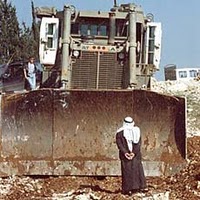No Suicide Bombings in Israel in 2009, Israeli Intelligence Agency Reports
The domestic intelligence agency Shin Bet said in its annual report on "victims of terrorism," in 2009 the number of attacks on Israelis dropped sharply.

It said the number of attacks was at its lowest level since the start of the Palestinian intifada, or uprising, in 2000.
In all, 15 Israelis were killed during 2009, compared with 36 the previous year, it said. There were no suicide bombings in 2009, AFP reports.
Meanwhile, hundreds of people including international activists protested on both sides of a Gaza Strip border crossing on Thursday against Israeli closures imposed on the Hamas-ruled territory.
"It's a non-violent, peaceful gathering and the aim is to show the international community the suffering of the people of Gaza," Amjad al-Shawa, a Gaza-based organiser, told AFP.
Eighty-six international activists were allowed to enter the enclave on Wednesday from Egypt via the Rafah crossing, the only terminal not controlled by Israel, which has been mostly closed since Hamas seized power in June 2007.
Another 1,200 activists from around 40 countries remained in Cairo after the Egyptian authorities declined to allow the entire group to enter Gaza because of what they called the "sensitive situation" in the Palestinian territory.
Israel and Egypt have sealed the coastal enclave off from all but vital humanitarian aid since Hamas -- an armed Islamist group pledged to Israel's destruction -- seized power there in 2007.
On December 27, 2008 Israel launched a massive military offensive on Gaza in a bid to halt Palestinian rocket and mortar attacks. Some 1,400 Palestinians and 13 Israelis were killed during the 22-day conflict, AFP reports.
It was also reported, after Hamas forced its rival Fatah from Gaza in 2007, Israel and Egypt tightened their restrictions on Gaza , banning virtually all exports and allowing in only humanitarian basics.
Much legal economic activity had ground to a halt even before Israel 's military operation a year ago destroyed or seriously damaged 700 businesses.
But over the years a flourishing mini-economy developed around the tunnels.
Gazans rely on them for cheap Egyptian petrol and products to supplement the basic foodstuffs Israel allows in.
And larger items such as fridges, washing machines, cows, motorbikes, disassembled cars, and - according to Israel - weapons are also moved through the tunnels.
Gazan economist Omar Shaban estimates that the tunnels trade amounts to about US $20-25m a month, and supplies two-thirds of the range of products on sale in Gaza, BBC News reports.
Subscribe to Pravda.Ru Telegram channel, Facebook, RSS!





